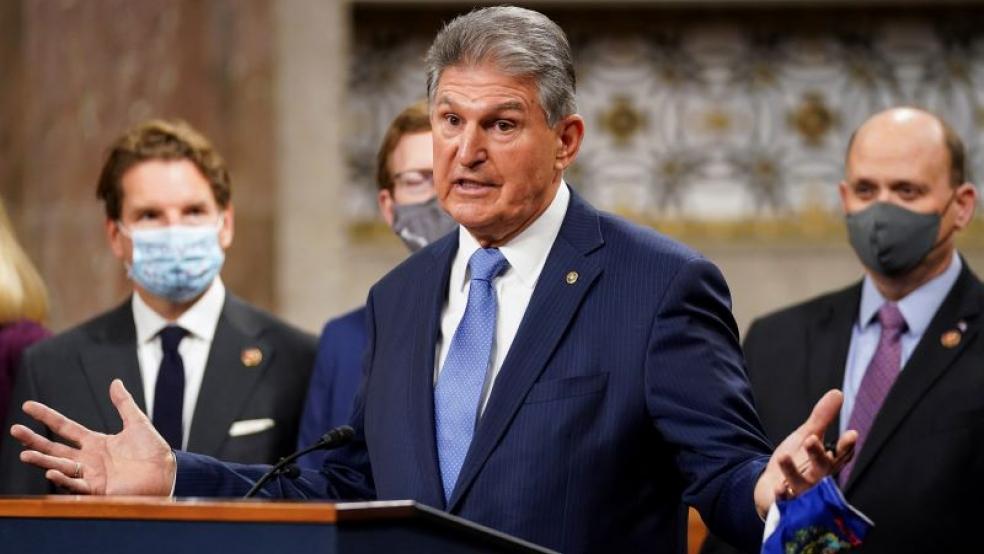Trick or treat? As they push to pass their economic agenda, Democrats still don’t know which their Halloween deadline will turn out to be.
As a reminder, Democratic leaders publicly set the end-of-month deadline after they were forced to delay a promised House vote on the Senate-passed bipartisan infrastructure bill late last month. Party leaders had hoped to buy some time for clashing centrists and progressives to come together on the details of their multi-trillion-dollar Build Back Better plan.
The Halloween deadline has some added importance, too, since a 30-day extension of funding for surface transportation programs is also set to expire. Democrats are also eyeing the deadline with a tight Virginia governor’s race in mind, hoping to deliver a lift to Democrat Terry McAuliffe’s campaign. “If McAuliffe loses, it could put a chill on Democrats’ agenda and prompt hand-wringing over whether the party failed to boost him enough in a difficult race against Republican Glenn Youngkin,” Politico’s Heather Caygle and Burgess Everett wrote over the weekend.
To meet their deadline, Democrats need to make some significant progress. Yet their numerous differences over the size and scope of the bill to bolster the social safety net, combat climate change and raise taxes on the wealthy and corporations have been difficult to bridge. Instead, the mounting frustrations erupted in recent days into something of an open feud between Sens. Bernie Sanders (I-VT), the Senate Budget Committee chair pushing for an expansive package, and Joe Manchin (D-WV), the centrist holdout who has sought to limit the size of the plan and objects to key details.
Sanders on Friday night published an op-ed in the Charleston Gazette-Mail in Manchin’s home state, making the case that the full $3.5 trillion package — which he says is already a compromise from his initial vision of a $6 trillion bill — would help working families and pressing for Manchin’s support. “This reconciliation bill is being opposed by every Republican in Congress as well as the drug companies, the insurance companies, the fossil fuel industry and the billionaire class,” Sanders wrote. “They want to maintain the status quo in which the very rich get richer while ordinary Americans continue to struggle to make ends meet.”
Manchin blasted back in a statement Friday night: "This isn't the first time an out-of-stater has tried to tell West Virginians what is best for them despite having no relationship to our state," he said. He added that 52 senators — he, Kyrsten Sinema (D-AZ) and 50 Republicans — have “grave concerns” about the Democratic package. "Congress should proceed with caution on any additional spending and I will not vote for a reckless expansion of government programs. No op-ed from a self-declared Independent socialist is going to change that."
So where do things really stand?
Politico reports: “A series of calls Sunday with sources we trust to give us an honest read on the state of play turned up some genuine optimism they can get it done. At least perhaps an outline of an agreement.”
On the other hand, Punchbowl News reports there’s no chance that the reconciliation package will be done by the end of the month:
“It’s not even clear that an agreement is possible on a topline number by that date. There’s daily staff-level discussions between House and Senate leadership aides and committee staffers, along with White House officials, but no one seems willing to make the tough political decisions required in order to reduce a $3.5 trillion reconciliation package to the $1.5 trillion to $2 trillion level that Manchin, Sinema and other moderates will accept. … At this point, while the message publicly is that there’s ‘progress’ in the discussions, it doesn’t appear to match what’s happening behind the scenes.”
What Manchin wants: The West Virginia senator has reportedly been exerting his influence to shape the reconciliation package. Coral Davenport of The New York Times reported late Friday that White House staffers were revising President Biden’s climate agenda after Manchin made clear that he opposes a program that would push utilities to replace coal- and gas-fired power plants with wind, solar and nuclear energy. One expert on climate policy told the Times that the $150 billion clean electricity program “is absolutely the most important climate policy in the package,” but Davenport reported that it would likely be dropped from the Democratic plan.
Axios followed that report with one on Sunday saying that Manchin has demanded that the expanded child tax credit that Democrats hope to extend for four years must include a work requirement and an income cap of about $60,000. “While Manchin’s demands would dramatically weaken one of President Biden’s signature programs to help working families, they also would reduce the package’s overall costs,” Axios’s Hans Nichols wrote.
Nichols added that “Manchin is open to Biden's $450 billion plan to subsidize day care and offer free universal preschool” but noted that Manchin wants tighter income caps for the day care subsidies. The senator reportedly is also less interested in a paid family leave plan that would cost up to $450 billion or a $400 billion elder-care program.
The outlook: Democrats may have trouble meeting their Halloween deadline, which would then force them to again decide whether to vote on the bipartisan infrastructure bill — as centrists want — or try to buy some more time. But there are other critical deadlines looming, including December 3, when government funding is set to run out, and lawmakers will still have to deal with the debt ceiling again.
“The party will once again be staring down a government shutdown and a possible debt ceiling default,” Politico’s Playbook notes. “Good luck dealing with those things plus a pair of trillion-dollar-plus bills — in the span of a few weeks.”
On top of that, Biden is set to be in Glasgow, Scotland at the end of the month for the UN climate summit, potentially making it a bit more complicated for him to close any deal with lawmakers.





